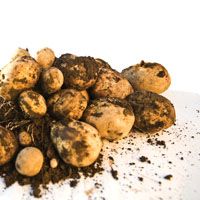Healthy eating?
Whether organic produce provides any actual health benefits is still controversial, and a recent study of organic carrots, onions and potatoes has claimed that the process may add nothing at all.

Organic food has increased in popularity over recent years, with environmental protection, increased animal welfare, taste and freshness all cited as important reasons for this demand. Whether organic produce provides any actual health benefits is still controversial, and a recent study of organic carrots, onions and potatoes has claimed that the process may add nothing at all.
Differences between organic and conventional agricultural processes can affect the nutrient content of plants; however previous studies have generated conflicting results. Many of these failed to take geographical locations and growth season into account, which a study published in the Journal of Agricultural and Food Chemistry aimed to address.1
A group of bioactive secondary plant metabolites called polyphenols have been speculated to have positive health effects, including a decreased risk of heart diseases, dementia and cancer. The study compared selected polyphenols — flavonoids and phenolic acids — to determine the effect of the growth systems. Plants were analysed by pressurized liquid extraction and high‑performance liquid chromatography–ultraviolet quantification and seven flavonoids were detected in onions as well as one and three phenolic acids in carrots and potatoes, respectively. A significant year-to-year variation of one flavanoid in onions was observed but according to the study no other significant differences between systems was found.
According to the researchers, “on the basis of the present study carried out under well-controlled conditions, it cannot be concluded that organically grown onions, carrots and potatoes generally have higher contents of health‑promoting secondary metabolites in comparison with the conventionally cultivated ones.”
1. M. Soltoft et al., J. Agric. Food Chem., 58, 10323–10329 (2010).
This story originally appeared in The Column. Click here to view that issue.
Analytical Challenges in Measuring Migration from Food Contact Materials
November 2nd 2015Food contact materials contain low molecular weight additives and processing aids which can migrate into foods leading to trace levels of contamination. Food safety is ensured through regulations, comprising compositional controls and migration limits, which present a significant analytical challenge to the food industry to ensure compliance and demonstrate due diligence. Of the various analytical approaches, LC-MS/MS has proved to be an essential tool in monitoring migration of target compounds into foods, and more sophisticated approaches such as LC-high resolution MS (Orbitrap) are being increasingly used for untargeted analysis to monitor non-intentionally added substances. This podcast will provide an overview to this area, illustrated with various applications showing current approaches being employed.
Polysorbate Quantification and Degradation Analysis via LC and Charged Aerosol Detection
April 9th 2025Scientists from ThermoFisher Scientific published a review article in the Journal of Chromatography A that provided an overview of HPLC analysis using charged aerosol detection can help with polysorbate quantification.
Removing Double-Stranded RNA Impurities Using Chromatography
April 8th 2025Researchers from Agency for Science, Technology and Research in Singapore recently published a review article exploring how chromatography can be used to remove double-stranded RNA impurities during mRNA therapeutics production.












